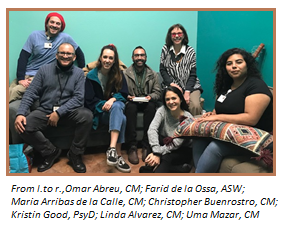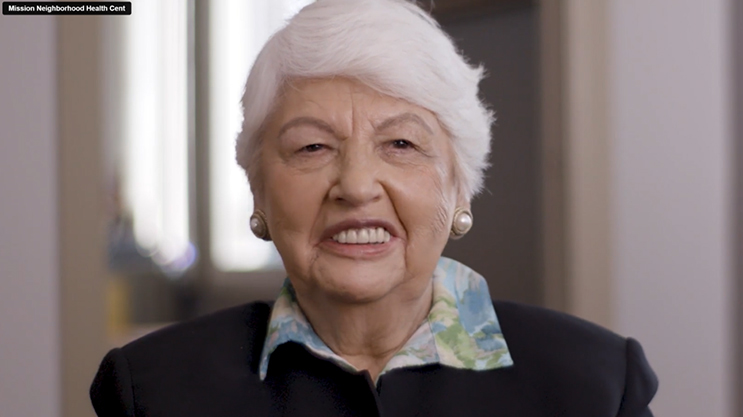enero 10, 2020
(English) MNHC Behavioral Health Program: Changing Lives for the Better
(English) More than one-quarter of adults in the U.S. experience some type of behavioral health disorder in a given year, according to the Centers for Disease Control and Prevention. While 29% of adults with a medical condition also have some type of mental health disorder, close to 70% of behavioral health patients also have a medical condition.
Understanding this connection, MNHC has a behavioral health program at each of its sites to address the behavioral health needs of its patients. This year, MNHC hired Silvia Sandoval, LCSW, to serve as Behavioral Health Director. Originally from Guatemala, Silvia moved here from the East Coast in 2015. She has been practicing professionally for the last 20 years, mostly in community non-profit organizations serving mariginalized and disenfranchised populations.
 As the new director, Silvia has been tasked to further integrate the behavioral programs both within their respective sites and among the medical clinics to meet the expanding needs of patients. Existing services include case management, psychotherapy and referrals to other resources, as needed. Staff work with patients to determine appropriate interventions and referrals including, as needed, asylum psychological evaluations in conjunction with outside organizations such as Instituto Familiar de la Raza. Sometimes, too, the work is “behind the scenes” advocating for patients who cannot afford a copay, getting medications for those who cannot pick them up and more.
As the new director, Silvia has been tasked to further integrate the behavioral programs both within their respective sites and among the medical clinics to meet the expanding needs of patients. Existing services include case management, psychotherapy and referrals to other resources, as needed. Staff work with patients to determine appropriate interventions and referrals including, as needed, asylum psychological evaluations in conjunction with outside organizations such as Instituto Familiar de la Raza. Sometimes, too, the work is “behind the scenes” advocating for patients who cannot afford a copay, getting medications for those who cannot pick them up and more.
“My vision is for our program to be more inclusive of other populations,” said Silvia “We’d like to expand our services to our existing patients including the community of transgender people of color. Often it’s tough for people who have several oppressed identities to navigate complicated or cumbersome systems on a daily basis.”
The behavioral health staff which numbers nearly 20, assists at the Shotwell and Excelsior sites,and the Mission Neighborhood Resource Center. Additionally, our staff provides phsycosocial support services at Case Quezada, a 52 unit supportive housing site for formerly homeless individuals with special needs.
Most of the referrals come from the MNHC primary care providers. Once a need is identified for a behavioral health referral, staff provides a “warm” handoff – i.e., a transfer of care between two members of the health care team that occurs with the patient and/or family. This handoff personalizes and customizes the referral ensuring that the patient understands how the care is integrated. A follow-up appointment is then set at which time next steps are determined.
Many of MNHC’s patients suffer from depression, anxiety and frequently present with a history of traumatic experiences. Often their symptoms are the result of the cumulative long-term effect of many stressors such as violence in their country of origin, their migration journey, domestic violence, abuse, historical trauma, minority stress, and discrimination.
“We have a wonderful staff of behavioral health providers at all of our sites who advocate for our  patients,” said Silvia. “And, it’s very important to me that they have the resources to support their roles,” she said. “Our goal is to make sure we are meeting patients ‘where they are at’, which is a great social work skill.”
patients,” said Silvia. “And, it’s very important to me that they have the resources to support their roles,” she said. “Our goal is to make sure we are meeting patients ‘where they are at’, which is a great social work skill.”
So how do staff know they are making a difference? Behavioral health metrics are grounded in developing a relationship with patients focused on engendering trust that ideally leads to behavioral change and improved health outcomes. MNHC staff measure their “success” by looking at metrics such as a patient returning for care, even if just for filling out a form, a patient telling “their story”, sometimes for the first time, communicating with the patient’s primary care provider, the number of referrals and even getting a patient to sign up for Healthy San Francisco or Medicaid – all of which speak to engendering a sense of agency by the patient.
“If we can change the life of even one patient, we know our work makes a difference,” said Silvia. And no doubt, with all the efforts of the committed staff, many patients’ lives at MNHC will change for the better.



